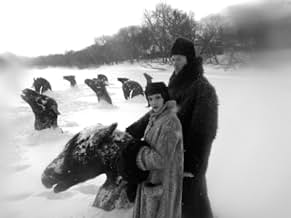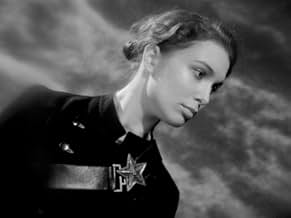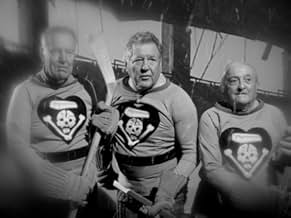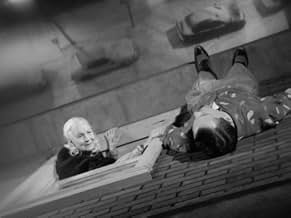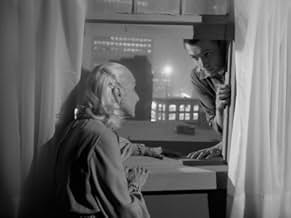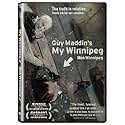ÉVALUATION IMDb
7,5/10
5,8 k
MA NOTE
Ajouter une intrigue dans votre langueFact, fantasy and memory are woven seamlessly together in this portrait of film-maker Guy Maddin's home town of Winnipeg, Manitoba.Fact, fantasy and memory are woven seamlessly together in this portrait of film-maker Guy Maddin's home town of Winnipeg, Manitoba.Fact, fantasy and memory are woven seamlessly together in this portrait of film-maker Guy Maddin's home town of Winnipeg, Manitoba.
- Prix
- 4 victoires et 17 nominations au total
Histoire
Le saviez-vous
- AnecdotesDirector Guy Maddin provided live narration at many film festival screenings.
- Générique farfeluTapioca Wrangler - Marnie Patuck
- ConnexionsFeatured in My Winnipeg: Live in Toronto (2008)
- Bandes originalesWonderful Winnipeg
Written by Leon Naleway
Performed by The Swinging Strings (vocal by Jim Wheeler)
Courtesy Shawn Nagy
Played during the opening credits
Commentaire en vedette
Winnipeg is to Guy Maddin as Baltimore is to John Waters. It's very unfashionability is its inspiration. But where Waters dwells on hairspray and bouffant dresses and twisted vowels, Maddin describes Winnipeg as a place of perpetual snow, destroyed hockey rinks, and sleepwalkers. "Winnipeg, Winnipeg, Winnipeg, Winnipeg...." he begins his incessant voice-over as the first of his typically distressed, nostalgic black and white images in square format appear showing long-ago men and women walking in snow-covered streets and a man dozing in a train car whose big window is like a movie screen showing figures and the big face of his mother. Sometimes blurry phrases flicker onto the screen echoing his words, like a refrain.
The man (Darcy Fehr) is meant to be himself, getting out of town. "I've got to leave it, I've got to leave it," he chants, and then speculates that maybe he can film his way out of Winnipeg, putting all his past on celluloid and thereby ridding himself of its fascination so he can move elsewhere.
For this poem and rant about his native city, which he says he wants to leave and can't, Maddin hired actors to play his mother and some of his siblings and borrowed his girlfriend's pug to stand in for the childhood chihuahua. He leased their old house and moved the old furniture (or facsimiles) into it, distributing a runner carpet and shabby couches in the living room and an old TV. His mother is played by veteran B-picture vixen Ann Savage. Black and white images of what purports to be his real family back in the Fifties flash on the screen alternating with their hired look-alikes as Maddin spins arcane anecdotes about his childhood and drops in the occasional fact. An old department store and a restaurant that served orange jello figure prominently, as does the dynamiting of a treasured tree and a hockey arena. If there is a logic to this quirky ramble, it's as sui generis as you can get.
We don't come away with a sense of Maddin's actual past, because all his anecdotes seem highly embroidered, like his mother's grabbing some friends' 75-year-old myna bird--which ran free in the house and had "a large vocabulary"--and smashing it to the floor because she was afraid of birds. Or the family threatening their mother with a parakeet to make her get out of bed and cook them a meatloaf. Or the team of ancient hockey stars, all suited up, one known to be dead his face all covered in bandages, playing in a half-destroyed arena, while Maddin sings their praises and curses the establishment of the NHL, which he regards as the beginning of the end. He says his father was a hockey executive, and he grew up in the locker room--was even born in the dressing room of the Winnipeg Maroons. According to him, Winnipeg has a secret network of back streets that parallels the main ones, and to pacify two rival taxi companies one was allowed to ride only on the main streets and the other only on the back alleys, where the ride over the snow is cushiony. The city he invents has an annual "If Day" when the town is invaded by mock Nazis who rename it "Himmlerstadt." A racetrack fire disaster caused a dozen horses to become buried in the earth with just their giant heads out of the snow in attitudes of agony. People come later to visit and picnic. In the family living room they watch a show called "Ledge Man" every day (it's run "for fifty years") in every episode of which the actress playing Maddin's mother talks the actor playing Maddin out of jumping from a ledge to his death.
Maddin calls this film, done for the "Documentary Channel," a "docu-fantasia," and that's what it is--sort of. It's hard to pin a genre to his film-making and this one is also an imaginary autobiography. He depicts himself living in an insular snow-globe parallel universe (sometimes fake slant lines of white snow are superimposed on scenes)--like the parallel system of back streets. The voice-over is a kind of crotchety incantation; Maddin has said this could be called "A Self-Destructive Sulk." What entertains, in its fey and offbeat way, is the man's humorous detachment; what appeals is the sense of a cozy far-off snowed-in world whose present is so remote it's like its past, a town that isn't very old but seems as if it is. For all the detail about growing up in a hairdressing establishment, lying in the living room with the family watching TV, being trapped in an indoor swimming pool complex on three levels among naked boys with "hairless boners" who refuse to swim, there's no sense of personal revelation at all, any more than in Dylan Thomas' "A Child's Christmas in Wales." And in his interweaving of the invented and the real, the contemporary and the archival in flickering dreamlike images, this movie has the power to enchant.
But also to numb. If Winnipeggers are sleepwalkers, the viewers of 'My Winnipeg' may at moments become sleep-sitters. And yet for a filmmaker so obviously withdrawn and secretive, this is his most autobiographical and perhaps most accessible and appealing work so far. "Amusing, elegant, inconsequential and it doesn't overstay its limited welcome," a London critic writes. I guess that's fair.
The man (Darcy Fehr) is meant to be himself, getting out of town. "I've got to leave it, I've got to leave it," he chants, and then speculates that maybe he can film his way out of Winnipeg, putting all his past on celluloid and thereby ridding himself of its fascination so he can move elsewhere.
For this poem and rant about his native city, which he says he wants to leave and can't, Maddin hired actors to play his mother and some of his siblings and borrowed his girlfriend's pug to stand in for the childhood chihuahua. He leased their old house and moved the old furniture (or facsimiles) into it, distributing a runner carpet and shabby couches in the living room and an old TV. His mother is played by veteran B-picture vixen Ann Savage. Black and white images of what purports to be his real family back in the Fifties flash on the screen alternating with their hired look-alikes as Maddin spins arcane anecdotes about his childhood and drops in the occasional fact. An old department store and a restaurant that served orange jello figure prominently, as does the dynamiting of a treasured tree and a hockey arena. If there is a logic to this quirky ramble, it's as sui generis as you can get.
We don't come away with a sense of Maddin's actual past, because all his anecdotes seem highly embroidered, like his mother's grabbing some friends' 75-year-old myna bird--which ran free in the house and had "a large vocabulary"--and smashing it to the floor because she was afraid of birds. Or the family threatening their mother with a parakeet to make her get out of bed and cook them a meatloaf. Or the team of ancient hockey stars, all suited up, one known to be dead his face all covered in bandages, playing in a half-destroyed arena, while Maddin sings their praises and curses the establishment of the NHL, which he regards as the beginning of the end. He says his father was a hockey executive, and he grew up in the locker room--was even born in the dressing room of the Winnipeg Maroons. According to him, Winnipeg has a secret network of back streets that parallels the main ones, and to pacify two rival taxi companies one was allowed to ride only on the main streets and the other only on the back alleys, where the ride over the snow is cushiony. The city he invents has an annual "If Day" when the town is invaded by mock Nazis who rename it "Himmlerstadt." A racetrack fire disaster caused a dozen horses to become buried in the earth with just their giant heads out of the snow in attitudes of agony. People come later to visit and picnic. In the family living room they watch a show called "Ledge Man" every day (it's run "for fifty years") in every episode of which the actress playing Maddin's mother talks the actor playing Maddin out of jumping from a ledge to his death.
Maddin calls this film, done for the "Documentary Channel," a "docu-fantasia," and that's what it is--sort of. It's hard to pin a genre to his film-making and this one is also an imaginary autobiography. He depicts himself living in an insular snow-globe parallel universe (sometimes fake slant lines of white snow are superimposed on scenes)--like the parallel system of back streets. The voice-over is a kind of crotchety incantation; Maddin has said this could be called "A Self-Destructive Sulk." What entertains, in its fey and offbeat way, is the man's humorous detachment; what appeals is the sense of a cozy far-off snowed-in world whose present is so remote it's like its past, a town that isn't very old but seems as if it is. For all the detail about growing up in a hairdressing establishment, lying in the living room with the family watching TV, being trapped in an indoor swimming pool complex on three levels among naked boys with "hairless boners" who refuse to swim, there's no sense of personal revelation at all, any more than in Dylan Thomas' "A Child's Christmas in Wales." And in his interweaving of the invented and the real, the contemporary and the archival in flickering dreamlike images, this movie has the power to enchant.
But also to numb. If Winnipeggers are sleepwalkers, the viewers of 'My Winnipeg' may at moments become sleep-sitters. And yet for a filmmaker so obviously withdrawn and secretive, this is his most autobiographical and perhaps most accessible and appealing work so far. "Amusing, elegant, inconsequential and it doesn't overstay its limited welcome," a London critic writes. I guess that's fair.
- Chris Knipp
- 2 août 2008
- Lien permanent
Meilleurs choix
Connectez-vous pour évaluer et surveiller les recommandations personnalisées
- How long is My Winnipeg?Propulsé par Alexa
Détails
- Date de sortie
- Pays d’origine
- Sites officiels
- Langue
- Aussi connu sous le nom de
- 나의 위니펙
- Lieux de tournage
- sociétés de production
- Consultez plus de crédits d'entreprise sur IMDbPro
Box-office
- Budget
- 600 000 $ US (estimation)
- Brut – États-Unis et Canada
- 159 363 $ US
- Fin de semaine d'ouverture – États-Unis et Canada
- 14 309 $ US
- 15 juin 2008
- Brut – à l'échelle mondiale
- 316 743 $ US
- Durée1 heure 20 minutes
- Couleur
- Mixage
- Rapport de forme
- 1.33 : 1
Contribuer à cette page
Suggérer une modification ou ajouter du contenu manquant

Lacune principale
By what name was My Winnipeg (2007) officially released in India in English?
Répondre






